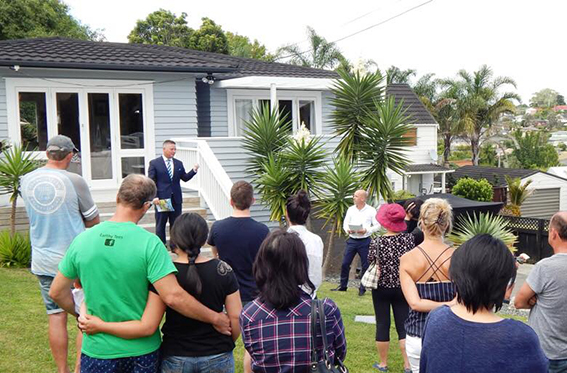
13 Jul I want to buy but auction day is scary.
Bidding for and buying a house at auction can feel intimidating if you have never done it before but a little bit of preparation and homework can make the process far less stressful and more empowering.
Familiarise yourself with the process
The simplest and one of the most helpful things you can do is go to a few auctions to familiarise yourself with the process and the environment. Consider doing this well before you’ve found a place you’re ready to bid for, so you can view the auction process and watch buyers bidding strategies.
Once you’ve found a property you’d like to bid for, see if you can find another auction called by the same auctioneer who will oversee the sale of that property. Anything you can do to make your bidding auction day more familiar to you will help you on that day. Feel free to ask the sales consultant you are working with to introduce you to the Auctioneer, but also talk the whole process through with the consultant, they will know you are interested in the property, they in turn will be keen to assist you to buy.
Do your due diligence
This is obviously important before buying any property but it is vital that you know everything you need to know before the auction starts, because if you win the auction you will be signing the contract immediately, and handing over your deposit right there.
This means checking building reports, LIM reports, having any contamination or pest checks completed and having your solicitor check the contract of sale. The benefit of auction is that a lot of these reports are provided to you, please realise any reports are commissioned by the owner for the owners benefit, but they will give you some comfort and are usually commissioned from reputable companies.
Some buyers do get frustrated at the expense of this process, only to not be a successful bidder and having to repeat the whole process with a new property. It helps to think about what the long-term cost could be of not completing that due diligence only to find something critical is wrong with the property.
You can also avoid that problem in part by being very clear about what you are looking for in a property to purchase by viewing as many as possible before you commit to the next stage of doing the due diligence.
Before the auction it’s also important to register your interest in the property. That way the sales consultant can keep you informed of any pre-auction offers which may bring the auction forward, or any other developments impacting the auction, additional documentation.
Also make sure you have read the auction particulars and conditions of sale and discuss with your solicitor.
Get your finances in order
Make sure you have your finance pre-approved by your bank so you are ready to sign on the dotted line and pay the deposit – usually 10% of the purchase price – immediately following the auction.
And, of course, make sure you are very clear about how much you have to spend. It’s a good idea to have two prices in the back of your mind: the amount you would prefer to pay and an absolute upper limit that you would pay if you had to. We call this the “fighting fund”.

At the auction
Arrive early to the auction and find a good position where you will be clearly seen by the auctioneer, and ideally, where you can have a good view of other bidders.
Before the auction begins the auctioneer will identify and describe the property being sold.
The auctioneer may also indicate if any bidders are participating by phone, and that he may through the course of the auction make “vendor bids”. These are bids made on behalf of the seller, below the reserve, they are sometimes utilised just to get the auction started. Vendor bids are allowed provided they are clearly identified by the auctioneer. The best way to think of the vendor bid is that it is a counter offer from the owners and if you are not prepared to bid more than the vendor bid they are happy not to sell. Typically, an auctioneer will place their last vendor bid well below the reserve price, so if you are prepared to pay more than the vendor bid announced, feel confident and bid again.
To start the auction the auctioneer will call for an opening bid and will then nominate the increments at which the bidding can be raised.
To place your bid, confidentially attract the auctioneer’s attention by raising your hand and calling out your bid amount, if you or no one else bids that’s when a vendor bid might be placed by the auctioneer to start the bidding.
Once the property has reached the reserve price the auctioneer will announce that it is officially on the market and will sell to the highest bidder.
If the property does not reach the reserve price the auctioneer can pause the auction.
They will negotiate with the owner and the highest bidder to see if a price agreement can be reached, usually this will happen either in a side room or perhaps on the floor, if agreement can be reached on a price, the reserve will be adjusted and typically the auction comes back out to the auction room and if there is no further bidding by anyone it will be sold at the negotiated price. If further bidding occurs you have a choice ….are you’re prepared to pay a little more or not.
If either there is no bidding, the bidding stops on a vendor bid below the reserve, or you fail to agree on an altered reserve price, the property is passed in and the auction is over. This is where it could get frustrating for you as a buyer, because then any interested parties who where not in a cash position to bid at the auction, will now also have a chance to buy after auction and you will potentially be involved in a multi offer tender type situation, where you likely get one chance to offer your very best price.
The best advice I can give you is ….if you are in a position to bid at an auction, don’t play games, at least at an auction you can see and hear the competition, or negotiate with the vendor. Once its passed in, you have blind tender, multi offer type possibilities to contend with.
If you really, really don’t want to bid at the auction…
You can nominate a sales consultant to do your bidding for you. If you choose this option make sure you have complete faith that the sales consultant will follow your bidding instructions, and that they are fully informed of your bidding plan.
All the best with Auction, don’t be frightened, just do your home work, and bid to whatever level you have decided before hand, if its enough you will have purchased and that will be a relief, if its not enough, no worries…next.
Jim Davis
South Island Regional Manager


